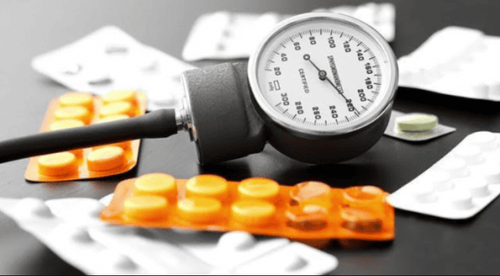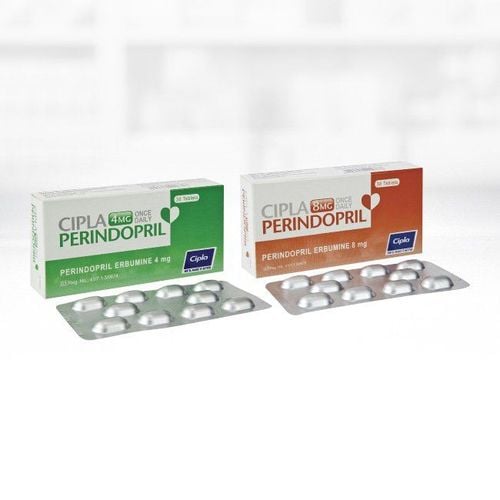This is an automatically translated article.
Hyperium medicine 1mg has the main ingredient Rilmenidine. This medication is used to treat mild to moderate hypertension. However, the use of the drug can cause some unwanted side effects. Therefore, patients should strictly follow the instructions of the doctor or pharmacist.
1. What is Hyperium? What does Hyperium do?
1.1. Pharmacodynamics of Hyperium Drugs Main active ingredient Rilmenidine is an oxazoline with antihypertensive properties, acting simultaneously on the vasomotor center of the medulla oblongata and on the periphery. Rilmenidine is more selective for imidazoline receptors than a2-adrenergic receptors in the brain, thus distinct from a2 agonists.
At therapeutic doses of Hyperium 1 mg/day orally once or 2 mg/day in 2 divided doses, placebo-controlled studies have shown efficacy in the treatment of hypertensive disease in mild hypertension. and medium. The potency of Hyperium is maintained overnight and during exercise. These results have been confirmed by long-term studies with good treatment results.
At the therapeutic dose of Hyperium 1mg/day, placebo-controlled studies have shown that Hyperium has no effect on the ability to concentrate; Some random events such as drowsiness, dry mouth, and constipation occurred with the same frequency as the placebo group.
At the therapeutic dose of Hyperium 2 mg/day, controlled studies with a2 agonists administered at doses for similar antihypertensive effects have shown a significantly lower incidence of adverse events. and frequency for the rilmenidine group.
At therapeutic doses, Hyperium does not affect cardiac functions, does not cause salt and water retention and does not disturb the metabolic balance:
Hyperium maintains its antihypertensive effect for 24 hours after oral administration drugs with a decrease in total peripheral resistance, without altering cardiac output. Indicators of electrophysiology and contractility of the heart are not changed; Hyperium does not affect the ability to adapt to changes in position, especially in the elderly, and the physiological responsiveness of heart rate to exercise; Hyperium does not change renal blood flow, glomerular filtration and renal function; Hyperium also did not alter glucose regulation, either in insulin-dependent or non-insulin dependent diabetes mellitus, and did not alter parameters of lipid metabolism. 1.2. Pharmacokinetics of the drug Hyperium Absorption
Fast: after taking a single dose of Hyperium from 1 hour 30 minutes to 2 hours, the drug reaches a maximum plasma concentration of 3.5 ng/ml; Complete: The absolute bioavailability of Hyperium is 100%, with no reduction in effects after the first round of hepatic metabolism; Both: the variation in metabolic rate from person to person is very low and food does not change the bioavailability of Hyperium; Absorption rate remained unchanged when administered at the manufacturer's recommended therapeutic dose. Dispensability
The plasma protein binding rate is less than 10%. The volume of distribution is 5 l/kg.
Metabolism potential
The active ingredient Rilmenidine is minimally metabolised. Metabolites are found in traces in the urine, mainly by hydrolysis of the oxazoline ring or by oxidation.
Elimination ability
Active ingredient Rilmenidine is eliminated mainly by the kidneys and excreted in the urine. The mean half-life was 8 hours and was not altered by dose or repeated administration. Hyperium has a prolonged duration of action, significantly sustained for 24 hours after the last dose, in hypertensive patients treated with a therapeutic dose of Hyperium 1 mg daily.
2. How to use and dose Hyperium
2.1. How to take Hyperium Drug Hyperium 1mg is used for oral treatment. The drug is only recommended for use by adults and is not intended for use in children.
2.2. Therapeutic dose of Hyperium The recommended therapeutic dose per day is one Hyperium 1mg tablet, taken once in the morning, before meals. If there is no response after 1 month of treatment, the dose can be increased to 2 tablets of Hyperium 1mg per day, divided into 2 times (1 tablet in the morning, 1 tablet in the evening). For patients with renal failure (with creatinine clearance greater than 15 ml/min): In principle, the dosage should not be changed. In any case, you need to strictly follow the prescription prescribed by the treating doctor. Note on dosage: The above therapeutic dose is for reference only. The specific dose depends on the condition and the progression of the disease for each person. For the right specific therapeutic dose, you need to consult your treating doctor or medical professional.
2.3. In the event of an overdose of Hyperium: Symptoms that may occur in cases of overdose include significant hypotension and impaired concentration (decreased alertness). The treating doctor can appoint the patient to wash the stomach, also need to treat with symptomatic drugs. Hyperium 1 is dialyzable only to a small fraction.
In case of missed dose: If you miss a dose of Hyperium, take it as soon as possible. However, if it is almost time for your next dose, skip the missed dose and take your next dose at the scheduled time. Note that you should not double the prescribed therapeutic dose.
3. Undesirable effects of the drug Hyperium
Undesirable effects when using Hyperium drugs rarely occur, are benign and only transient when used at therapeutic doses, including: asthenia, palpitations, insomnia, somnolence, fatigue often with exertion, stomach pain, dry mouth, diarrhea, rash, skin rash;
Some undesirable effects may be encountered with less frequency such as: cold extremities, postural hypotension, sexual dysfunction, anxiety disorder, depressive syndrome, itching, edema, cramps, vomiting and hot flashes.
4. Hyperium drug interactions
To minimize possible drug interactions when taking many drugs, especially with sultopride, alcohol and beta-blockers used in heart failure (bisoprolol, metoprolol, carvedilol). When using Hyperium, you need to inform your treating doctor about the drugs or health protection foods you are using so that the doctor will consider and give specific advice on your use of the drug.
5. Some notes when using Hyperium medicine
5.1. Hyperium is contraindicated in the following cases:
Hypersensitivity or sensitivity to active ingredients Rilmenidine or other excipients. Psychosis , major depression ; Severe kidney failure; Combination therapy with sultopride; This drug should not be used in combination with: Alcohol, beta-blockers used in heart failure (bisoprolol, carvedilol, metoprolol). 5.2. Precautions when using Hyperium medicine Never stop using Hyperium 1mg medicine suddenly, the dose must be reduced gradually. When treating Hyperium 1mg drug should be regularly monitored by a doctor. Avoid the use of alcoholic beverages such as alcohol during the treatment period. Report to your doctor immediately if you have severe kidney failure or have recently been diagnosed with a heart condition. If in doubt, consult your treating doctor or pharmacist. 5.3. Other precautions for use Ability to drive and use machines: Hyperium 1mg may cause drowsiness if taken in excess of the prescribed dose or taken with other drugs that can impair concentration. Pregnancy: Avoid using Rilmenidine during pregnancy. Tell your doctor if you are taking medication and become pregnant. Lactation: Rilmenidine is not recommended for use in nursing women. Hyperium medicine 1mg has the main ingredient Rilmenidine. This medication is used to treat mild to moderate hypertension. To ensure the effectiveness of treatment and avoid side effects, patients need to take medicine according to prescription or consult a doctor, pharmacist for advice.
Follow Vinmec International General Hospital website to get more health, nutrition and beauty information to protect the health of yourself and your loved ones in your family.
Please dial HOTLINE for more information or register for an appointment HERE. Download MyVinmec app to make appointments faster and to manage your bookings easily.













